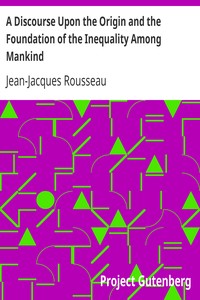A Discourse Upon the Origin and the Foundation of the Inequality Among Mankind
"A Discourse Upon the Origin and the Foundation of the Inequality Among Mankind" by J. J. Rousseau is a philosophical treatise written during the 18th century. The work explores the concepts of natural and moral inequality among humans, questioning the roots of societal disparities and the implications of civilization on human nature. Rousseau engages with the fundamental question of whether such inequalities are justified by the laws of nature or if they
stem from human conventions. At the start of the discourse, Rousseau introduces the topic by contrasting two forms of inequality: natural inequality, which is established by nature and relates to personal attributes such as age, health, and strength; and moral or political inequality, which arises from social conventions and results in varied privileges among people. He reflects on humanity’s evolution from a state of nature—where humans lived independently and with few needs—to a complex society marked by dependency, competition, and strife. In this opening portion, Rousseau sets a thought-provoking tone, prompting readers to reconsider their understanding of social structures and the often-unquestioned norms that govern their lives. (This is an automatically generated summary.)
Read or download for free
| How to read | Url | Size | |||
|---|---|---|---|---|---|
| Read now! | https://www.gutenberg.org/ebooks/11136.html.images | 183 kB | |||
| EPUB3 (E-readers incl. Send-to-Kindle) | https://www.gutenberg.org/ebooks/11136.epub3.images | 173 kB | |||
| EPUB (older E-readers) | https://www.gutenberg.org/ebooks/11136.epub.images | 173 kB | |||
| EPUB (no images, older E-readers) | https://www.gutenberg.org/ebooks/11136.epub.noimages | 124 kB | |||
| Kindle | https://www.gutenberg.org/ebooks/11136.kf8.images | 408 kB | |||
| older Kindles | https://www.gutenberg.org/ebooks/11136.kindle.images | 397 kB | |||
| Plain Text UTF-8 | https://www.gutenberg.org/ebooks/11136.txt.utf-8 | 172 kB | |||
| Download HTML (zip) | https://www.gutenberg.org/cache/epub/11136/pg11136-h.zip | 173 kB | |||
| There may be more files related to this item. | |||||
Similar Books
About this eBook
| Author | Rousseau, Jean-Jacques, 1712-1778 |
|---|---|
| Uniform Title | Discours sur l'origine et les fondements de l'inégalité parmi les hommes. English |
| Title | A Discourse Upon the Origin and the Foundation of the Inequality Among Mankind |
| Note | Wikipedia page about this book: https://en.wikipedia.org/wiki/Discourse_on_Inequality |
| Reading Level | Reading ease score: 34.6 (College-level). Difficult to read. |
| Language | English |
| LoC Class | JC: Political science: Political theory |
| Subject | Political science |
| Subject | Natural law |
| Subject | Equality |
| Category | Text |
| EBook-No. | 11136 |
| Release Date | Feb 1, 2004 |
| Most Recently Updated | Oct 28, 2024 |
| Copyright Status | Public domain in the USA. |
| Downloads | 700 downloads in the last 30 days. |
| Project Gutenberg eBooks are always free! | |

